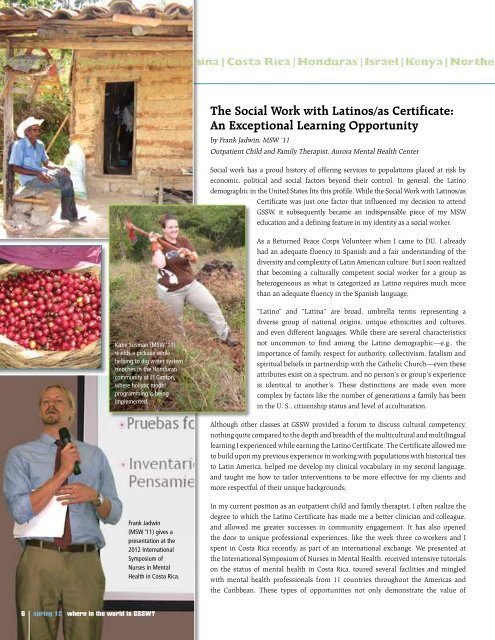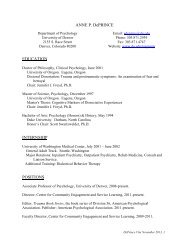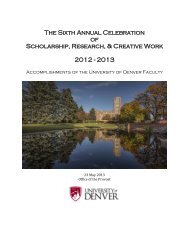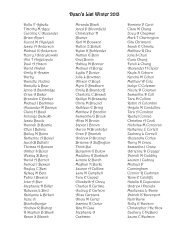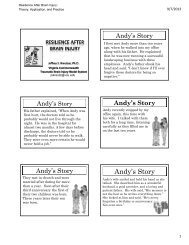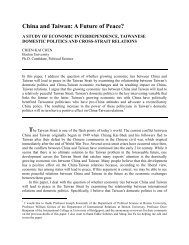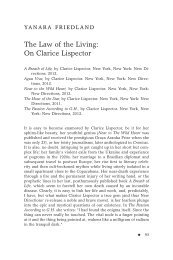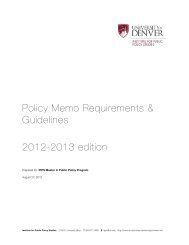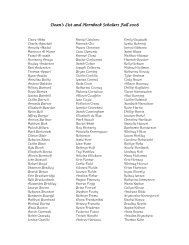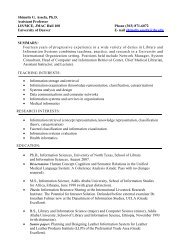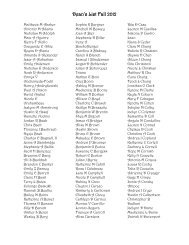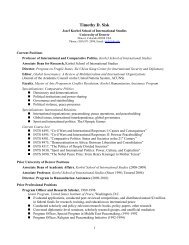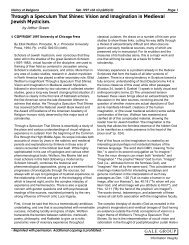Create successful ePaper yourself
Turn your PDF publications into a flip-book with our unique Google optimized e-Paper software.
Katie Susman (MSW ‘11)<br />
wields a pickaxe while<br />
helping to dig water system<br />
trenches in the Honduran<br />
community <strong>of</strong> El Canton,<br />
where holistic model<br />
programming is being<br />
implemented.<br />
Frank Jadwin<br />
(MSW ‘11) gives a<br />
presentation at the<br />
2012 International<br />
Symposium <strong>of</strong><br />
Nurses in Mental<br />
Health in Costa Rica.<br />
6 spring 12 where in the world is <strong>GSSW</strong>?<br />
The Social Work with Latinos/as Certificate:<br />
An Exceptional Learning Opportunity<br />
by Frank Jadwin, MSW ’11<br />
Outpatient Child and Family Therapist, Aurora Mental Health Center<br />
Social work has a proud history <strong>of</strong> <strong>of</strong>fering services to populations placed at risk by<br />
economic, political and social factors beyond their control. In general, the Latino<br />
demographic in the United States fits this pr<strong>of</strong>ile. While the Social Work with Latinos/as<br />
Certificate was just one factor that influenced my decision to attend<br />
<strong>GSSW</strong>, it subsequently became an indispensable piece <strong>of</strong> my MSW<br />
education and a defining feature in my identity as a social worker.<br />
As a Returned Peace Corps Volunteer when I came to DU, I already<br />
had an adequate fluency in Spanish and a fair understanding <strong>of</strong> the<br />
diversity and complexity <strong>of</strong> Latin American culture. But I soon realized<br />
that becoming a culturally competent social worker for a group as<br />
heterogeneous as what is categorized as Latino requires much more<br />
than an adequate fluency in the Spanish language.<br />
“Latino” and “Latina” are broad, umbrella terms representing a<br />
diverse group <strong>of</strong> national origins, unique ethnicities and cultures,<br />
and even different languages. While there are several characteristics<br />
not uncommon to find among the Latino demographic—e.g., the<br />
importance <strong>of</strong> family, respect for authority, collectivism, fatalism and<br />
spiritual beliefs in partnership with the Catholic Church—even these<br />
attributes exist on a spectrum, and no person’s or group’s experience<br />
is identical to another’s. These distinctions are made even more<br />
complex by factors like the number <strong>of</strong> generations a family has been<br />
in the U. S., citizenship status and level <strong>of</strong> acculturation.<br />
Although other classes at <strong>GSSW</strong> provided a forum to discuss cultural competency,<br />
nothing quite compared to the depth and breadth <strong>of</strong> the multicultural and multilingual<br />
learning I experienced while earning the Latino Certificate. The Certificate allowed me<br />
to build upon my previous experience in working with populations with historical ties<br />
to Latin America, helped me develop my clinical vocabulary in my second language,<br />
and taught me how to tailor interventions to be more effective for my clients and<br />
more respectful <strong>of</strong> their unique backgrounds.<br />
In my current position as an outpatient child and family therapist, I <strong>of</strong>ten realize the<br />
degree to which the Latino Certificate has made me a better clinician and colleague,<br />
and allowed me greater successes in community engagement. It has also opened<br />
the door to unique pr<strong>of</strong>essional experiences, like the week three co-workers and I<br />
spent in Costa Rica recently, as part <strong>of</strong> an international exchange. We presented at<br />
the International Symposium <strong>of</strong> Nurses in Mental Health, received intensive tutorials<br />
on the status <strong>of</strong> mental health in Costa Rica, toured several facilities and mingled<br />
with mental health pr<strong>of</strong>essionals from 11 countries throughout the Americas and<br />
the Caribbean. These types <strong>of</strong> opportunities not only demonstrate the value <strong>of</strong><br />
educational programs like the Latino Certificate, but are essential<br />
in building networks to refine mental health practices in an age <strong>of</strong><br />
globalization.<br />
As the number <strong>of</strong> Latinos in the U. S. continues to grow, there will<br />
be an ever-increasing need for social work education to provide<br />
culturally sensitive training to students. In fact, I believe our<br />
pr<strong>of</strong>ession’s current lack <strong>of</strong> preparedness for meeting the needs <strong>of</strong><br />
this population is alarming. Because providing effective, culturally<br />
competent services is a complex task that requires ongoing<br />
education and lifelong commitment, I highly recommend that any<br />
aspiring social worker take advantage <strong>of</strong> the exceptional learning<br />
opportunity <strong>of</strong>fered by <strong>GSSW</strong>’s Latino Certificate.<br />
Empowering Communities<br />
Through International Social Work<br />
by Katie Susman, MSW ’11, MA<br />
Global Brigades Honduras Program Manager/ Research and<br />
Evaluation Program Lead<br />
When I graduated from the <strong>University</strong> <strong>of</strong> <strong>Denver</strong>’s dual masters<br />
degree program in Social Work and International Studies last June,<br />
I was confident in my desire to travel the less-beaten track to serve<br />
others through international social work. Although I realized this<br />
field was untraditional and not the most financially lucrative, my<br />
passion for global social justice was unrelenting. Thus, green and<br />
eager to translate my theoretical knowledge into action, I found<br />
myself on a plane headed to Tegucigalpa, Honduras, in July 2011<br />
as the Research and Evaluation Program Lead for Global Brigades,<br />
an international NGO (non-governmental organization).<br />
Global Brigades is the largest student-led sustainable development<br />
organization in the world. In rural communities in Honduras,<br />
Panama and Ghana, we work in nine different areas including<br />
medical, dental, water, public health, micr<strong>of</strong>inance, business,<br />
architecture, law and environment. These programs empower<br />
communities to improve their quality <strong>of</strong> life through sustainable<br />
development initiatives. Global Brigades also provides opportunities<br />
for cultural exchange and collaborative learning, and it<br />
raises student and community awareness <strong>of</strong> the ways a holistic<br />
model <strong>of</strong> development addresses both community and individual<br />
needs.<br />
How did I come to choose this particular career path? As a prior<br />
Bachelor <strong>of</strong> Social Work (BSW) student, I was fascinated by the<br />
discipline’s dedication to empowerment, cultural sensitivity and<br />
Where in theWorld is <strong>GSSW</strong>?<br />
costa Rica | HonduRas<br />
strong Code <strong>of</strong> Ethics. I hoped to sustain these values in a future<br />
career in international social development. I felt strongly that<br />
international social development could best be achieved through<br />
cross-disciplinary action.<br />
As a community track student at <strong>GSSW</strong>, I was intrigued by the<br />
relationship between international development and social work<br />
in Latin America, particularly how community development could<br />
impact individual empowerment and quality <strong>of</strong> life. My studies<br />
sparked a strong interest in capacity building, research and<br />
evaluation, and program development. In my <strong>GSSW</strong> practicum,<br />
I conducted qualitative research and gained interviewing skills<br />
with migrant farm workers and survivors <strong>of</strong> human trafficking.<br />
My courses on social work with Latinos further strengthened my<br />
intent to work in community development in Latin America.<br />
We social workers constantly hear buzz words like “holistic” and<br />
“empower.” As students we were encouraged to think critically<br />
and analytically regarding non-pr<strong>of</strong>it organizations, leadership and<br />
transparency. We reflected on topics <strong>of</strong> privilege and oppression<br />
at great length. In the past seven months, I have translated these<br />
concepts into action in a growing international non-pr<strong>of</strong>it, while<br />
facilitating my pr<strong>of</strong>essional growth as a social worker.<br />
As the director <strong>of</strong> the Global Brigades Research and Evaluation<br />
Program, I have the opportunity to conduct baseline household<br />
surveys, lead research initiatives, support students in research and<br />
create relationships with communities and institutions. Ironically,<br />
statistics used to scare me. I sc<strong>of</strong>fed that “social workers don’t<br />
need to know how to manipulate numbers; we work with people!”<br />
Now I’ve developed a newfound appreciation for data, numbers<br />
that illustrate impact and data analysis that is one <strong>of</strong> the most<br />
effective ways to prove that your organization is “doing good.”<br />
Recently I was given the opportunity to serve as the Honduras<br />
Program Manager for Global Brigades. This new role encompasses<br />
program and staff development, inter-country operations, marketing,<br />
management, reporting and facilitation <strong>of</strong> the organization’s holistic<br />
model. I am constantly referring back to my time at <strong>GSSW</strong>, thankful<br />
for the well-rounded curriculum and field experiences that prepared<br />
me to work in the international social work field.<br />
While international social work is fraught with challenges, it<br />
provides me with an amazing opportunity to test my pr<strong>of</strong>essional<br />
mettle and personal fortitude in serving as a social worker abroad.<br />
A bilingual dual degree graduate, Susman earned her MA from<br />
DU’s Korbel School <strong>of</strong> International Studies at the same time she<br />
earned her MSW.<br />
where in the world is <strong>GSSW</strong>? spring 12 7


